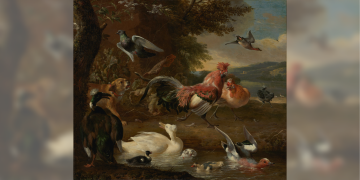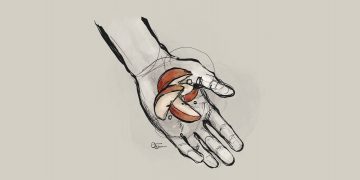(Read Part I here.)
PART II — A NEW TRUE SELF. On Christian Metamorphosis.
“[Christ says:] I want You.
I have not come to torment your natural self,
but to kill it.”
— Clive Staples Lewis. Mere Christianity (book 4, chapter 11: The New Men)
We Are: Not God but before Him
Through the social mirror dynamics mentioned in Part One, we’ve explored how we define ourselves by our (mis)conceptions. But how does the Word of God define us as Christians? What does the Bible say about our identity in Christ? God declares that we are:
- Bespoke. You were tailor-made: for Him, in His image. Like David, we are fearfully and wonderfully made (Psalm 139.13-14) and, like Jeremiah, God knew us before we were born (Jeremiah 1.5).
- Beloved. You are loved. God’s love for us is an Agape love: He loves us unconditionally (Romans 8.39).
- Begotten. You have arrived. We are children of God, made new in Christ—it is done; He’s already accepted us. He said yes first. (Ephesians 5.8)
While God is the Absolute Other for us to be contrasted with, this should not distance us from Him—quite the opposite. It can be hard for sons and daughters who look so unlike their Father to feel legitimate. We try to recognize ourselves in His face and often fail to. Doubt creeps in alongside our shame. We want to belong—to know with certainty that we do, but we struggle to accept our status as children of God. So, how can we reconcile the truth of our own bankruptcy with what these truths from God say about us and our value?
By becoming Christians, we are made new. As Lewis states in Mere Christianity, this requires “losing what we now call ‘ourselves.’” We agree to surrender what we currently are in order to be made into what we are meant to become. Think of your initial self as a caterpillar, of Christ as your cocoon, and of your new true self as the resulting butterfly. In order to become a butterfly, you must first let go of your ordinary, worldly caterpillar self. When you enter the cocoon, you take the first step toward becoming what you were always meant to be: you enter into Christ, are “born again.” God, who created you, will continue to work on your transformation—through grace, trials, and the Holy Spirit that lives within you inside the cocoon—until your real identity, the self you were intended to be, is fully revealed. We display our faith and trust in His faithfulness by offering ourselves up to Him in our current state.
Becoming Your Authentic Self
“Look to the LORD and His strength; seek His face always.” (1 Chronicles 16.11 NIV) [1]
Who is the author of your life-story? You, or God? We must learn to seek Him as He seeks us, fixing our eyes upon His face while He develops our true self. [2]
Here are some solutions I hope will help you shift focus:
❏ Become Mindful through Meditative Prayer. Reject destructive patterns and learn to differentiate Internal Noise (the harmful tapes you play to yourself) from the Internal Voice (guided by the Spirit, reflective of God’s nature, which expresses your passions and gratitude without falsehoods or vulnerability-impairing accoutrements).
❏ Where there is Safety, be Vulnerable. Seek to find safety in God and allies in others with whom you can connect on a deeper level.
❏ Let go. Breathe. Let go of the reins. We always try to wrestle control away from God, forgetting that He is for us. Remember His goodness and enjoy your Kid’s Pass; you are not in charge of all things—He is (which is good).
❏ Don’t be afraid. Be confident that He will see you through the fire. When we doubt our forgivability, or our status as children of God, we doubt the power of Christ’s sacrifice. There is no need for us to hide or fear. His gift is not something that could ever be earned, worked for, or deserved—not in a million lifetimes. Approach His throne of grace confident that you are accepted, loved, and longed for as you are (Hebrews 4.16).
Conclusion: Dokimion — Glad in the Face of Trials
James talks about our God-sent trials using the word Dokimion (trying, testing). Every day, God furthers the work He started in us. He will continue to shape us in His image, purifying us through tailored trials. Just as the silversmith tests precious silver until the metal is so free of superfluous matter that it reflects his face like a mirror, God too will take us by the hand, sustaining us with His strength and wisdom, through every trial of fire… until He sees His Own reflection when He looks into our face, and we receive the crown of life (James 1.2-4).
Our status as children of God is a permanent gift (Ephesians 2.8-10). It was purchased for us already, and at not slim a price (1 Corinthians 6.19). Don’t let your earthly perceptions, shame, or control-seeking keep you from recognizing that you belong in His light. You will never be more loved or redeemed than you are right now. You belong as you are.
______
Footnotes:
[1] The more you look away from you, the more of God shows through. In Mere Christianity, C.S. Lewis writes: “To love and admire anything outside yourself is to take one step away from utter spiritual ruin.”
[2] C.S. Lewis and Self-Awareness, by Robert C. Stroud — “‘The continual voice which tells you that your best actions are secretly filled with subtle self-regard, and your best prayers still wholly egocentric—must for the most part be simply disregarded—as one disregards the impulse to keep on looking under the bandage to see whether the cut is healing. If you are always fidgeting with the bandage, it never will.’ A text you should keep much in mind is I John 3.20: ‘If our heart condemns us God is greater than our heart.’ I sometimes pray ‘Lord give me no more and no less self-knowledge than I can at this moment make a good use of.’ Remember He is the artist and you are only the picture. You can’t see it. So quietly submit to be painted—i.e. keep on fulfilling all the obvious duties of your station (you really know quite well enough what they are!), asking forgiveness for each failure and then leaving it alone. You are in the right way. Walk—don’t keep on looking at it.”
______
Further Reading:
– Book: “Mere Christianity” by C.S. Lewis
– The Confessions of St. Augustine
– Brené Brown’s TED Talk: The power of vulnerability
































































Great post, Damien. And it’s great seeing others passing on C.S. Lewis’ wisdom!